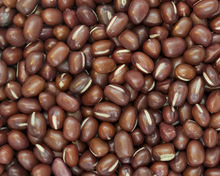Aduki bean (Azuki bean, Adzuki Bean)

| Aduki bean (Azuki bean, Adzuki Bean) in TCM:Explore the properties of Aduki bean (Azuki bean, Adzuki Bean) according to Chinese
Nutrition and Traditional Chinese Medicine (TCM):
Temperature: neutral
Channels: SP, HT, SI, KD
Flavors: sweet, sour
Tonifies: blood
Special Properties:
circulates blood, clears heat, clears damp, resolves water accumulations, eliminates toxins
In terms of Chinese medicine aduki beans (also referred to as adzuki bean or azuki bean) are known for their ability to tonify blood, regulate blood, clear heat, clear dampness, regulate water, and expel toxins.
Like all legumes (in the beans category) they are considered to be sweet in flavor, but they are also sour. Sources generally agree that they enter the Spleen, Heart, Small Intestine, and Kidney meridians. The temperature of aduki beans is neutral.
Adzuki bean can be helpful for diabetes, mumps, leukorrhea, excessive thirst, hunger, excretions of fluids, and edema. For diabetes soak the beans, boil 2 hours, and drink the liquid three times per day. For mumps mash sprouted red beans and apples and optionally add dandlion. [22]
Adzuki beans are a Chinese herb [See Also: Chi Xiao Dou]
Aduki bean is commonly consumed as food, which is listed separately on this web site.
Regular soybeans can be found at
[See Also: Soybeans] while fermented soybeans
(aka Tofu)
[See also: Tofu] matches more closely with the Chinese herbal therapy of the use of soybeans to improve health. The Chinese herbal remedy Chi Xiao Dou, which is a more concentrated form of fermented soybean, is available as an herbal powder on popular web sites like Amazon.com.
The fact that
fresh soybean,
fermented soybean (tofu),
and concentrated fermented soybean powder
(Chi Xiao Dou) affect the body in different ways is a testament to the fact that cooking and preparation methods can dramatically change the properties of herbs and foods.
[See Also: Food preparation in Chinese medicine]
Disclaimer: In accordance with our terms of service, by using this web site you agree that none of the information found on this web site constitutes medical advice. You should always consult your doctor before trying any particular food or herbal remedy to treat disease.
Folk remedies presented on this site are designed to address specifc TCM diagnoses, and are not one-size-fits-all. If you would like to learn more about Traditional Chinese Medicine (TCM) and how it relates to Chinese Nutrition, you can book in a free call with a licensed professional. There is no obligation to purchase.
[CLICK HERE for your free INITIAL CONSULTATION] |
